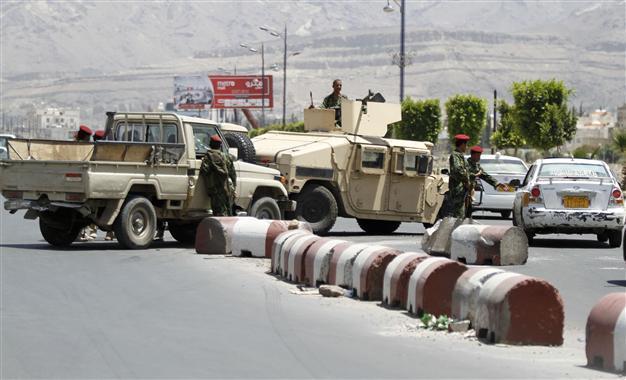Suicide car bomb kills 12 soldiers, civilian in Yemen
ADEN - Agence France-Presse

Soldiers stand next to a military vehicle blocking Al-Sabeen street, which leads to the presidential palace in Sanaa May 10, 2014. REUTERS Photo
A suspected Al-Qaeda suicide bomber Sunday killed 12 soldiers and a civilian in an attack on a military base in southeast Yemen, officials said, as government forces pursued jihadists in three restive provinces.
The bombing came just hours after three gunmen were killed when they attacked a checkpoint close to the presidential palace in the capital Sanaa, the same post where five soldiers died on Friday in a similar attack.
The two attacks appeared to be in reprisal for an army offensive against Al-Qaeda in the Arabian Peninsula in the contiguous provinces of Shabwa and Abyan, in the south, and Baida in the centre, which has been underway since April 29.
The bomber rammed an explosives-laden car into the military police base in Mukalla, the Hadramawt provincial capital, a security official said, adding that the assailant detonated his explosives next to a barracks.
The attack killed 12 soldiers, the military source said, while a medic said civilian succumbed to wounds sustained in the explosion.
"The suicide bomber belonged to Al-Qaeda," said the military source, without giving further information.
In Sanaa, a dawn attack by "terrorists" on a presidential guard checkpoint at Misbahi roundabout ended in the deaths of three gunmen and a civilian, the interior ministry said.
Authorities use the term "terrorists" to refer to Al-Qaeda militants in the impoverished Arab country.
Sanaa has been on alert for days, with tensions spiking after troops entered Azzan, a jihadist bastion in southern Shabwa province, prompting the United States to close its Sanaa embassy on Thursday.
On Friday, Defence Minister Mohamed Nasser Ahmad and two senior security officers escaped unscathed when gunmen ambushed their convoy as they returned from a tour of the south.
The army has said that the offensive against AQAP stronghold has inflicted heavy losses on the jihadists.
The interior ministry had warned that "huge losses" in jihadist ranks "will push Al-Qaeda to commit hysterical and desperate acts".
Al-Qaeda has "dormant cells" in Sanaa, warned military analyst Mohsen Khosruf, arguing that the attacks on the presidential palace "aim to ease pressure on their comrades in the south".
He said the army is likely to pursue its campaign in Baida, and Marib, east of Sanaa, where Al-Qaeda militants could have taken refuge following the south offensive.
A tribal source has said that as government forces close in on AQAP strongholds in Shabwa and Abyan, the militants are regrouping in Al-Kur, a mountain ridge stretching between Baida, Shabwa and Abyan provinces.
Baida Governor Ahmed al-Shaddadi has warned that those fleeing the fighting, as well as sleeper cells in Baida, "might commit acts of vengeance".
AQAP is considered by Washington as the most dangerous affiliate of Al-Qaeda and has been linked with failed terror attempts against the United States.
The jihadists took advantage of an Arab Spring-inspired uprising that forced autocratic president Ali Abdullah Saleh from power to seize large swathes of southern and eastern Yemen.
The army recaptured several major towns in 2012 but has struggled to reassert control in rural areas, despite the backing of tribal militiamen.
